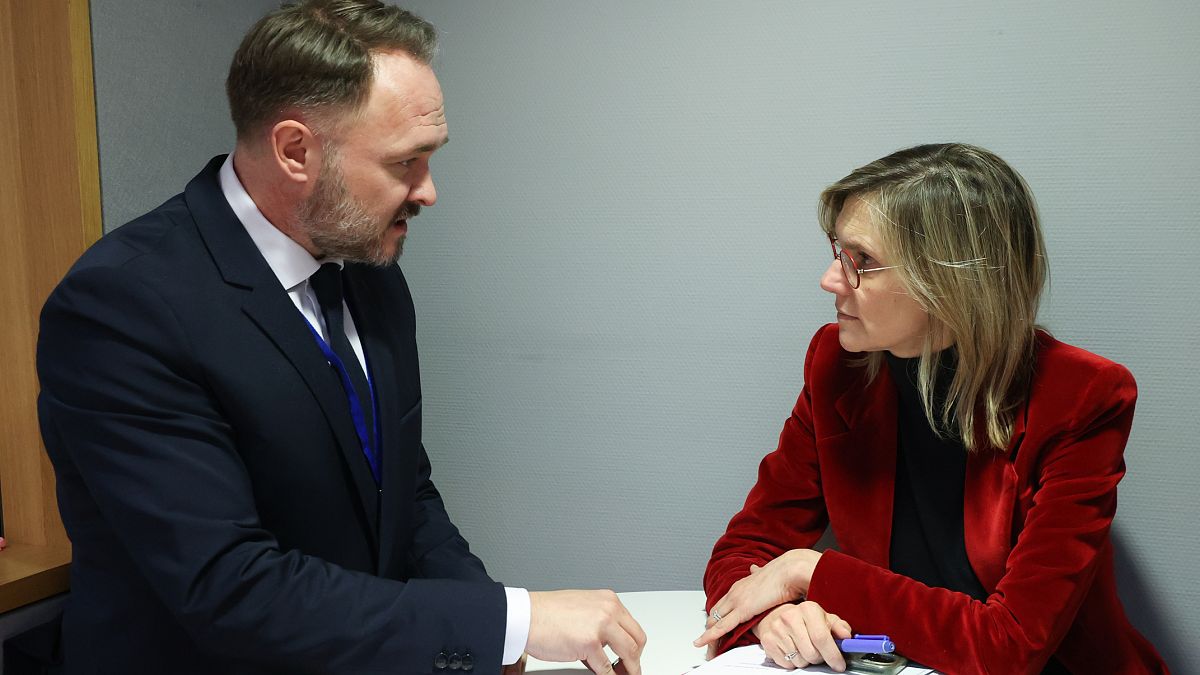A ministerial debate on the future of Europe’s energy system saw calls to build up cross-border power grids and end dependence on Russian fossil fuels, while France said it was time bring nuclear power into the centre of EU decarbonisation policy.
An EU law that has been instrumental in boosting wind and solar power deployment since 2009 should be replaced with one that recognises nuclear power as a crucial form of clean energy, France’s ecological transition minister Agnès Pannier-Runacher said while debating the bloc’s future energy strategy on Monday.
“France encourages the European Commission to establish a clear path to adequately reflect the role of nuclear energy in all its communications and legislative proposals,” the French minister said during an EU Council energy summit in Brussels.
Paris has been instrumental in pushing nuclear power up the EU policy agenda in recent years, securing its controversial inclusion in the EU’s list of approved technologies for ‘green’ investments, which opens the door to further policy and even financial even support.
Pannier-Runacher cited raft of legislation designed to cut Europe’s greenhouse gas emissions to 55% below 1990 levels by the end of the decade, underlining that the new European Commission must soon propose a new goal for 2040 in line with the EU’s target of net-zero by mid-century.
Once the 2030 deadline has passed, the Renewable Energy Directive, which requires the share of green energy to rise to at least 42.5%, should be replaced by new legislation with targets based instead on the “carbon intensity” of an energy source, she said.
Otherwise, there was little mention of the 2040 goal during the debate, with Dutch climate minister Sophie Hermans the only one to explicitly state her government’s support for a 90% cut, the minimum recommended by the independent European Scientific Advisory Board on Climate Change.
The EU Climate Law commits the bloc to achieving climate neutrality by 2050, and as well as the looming 2030 objective, also requires the European Commission to propose an interim target for 2040. Climate Commissioner Wopke Hoekstra has committed to the 90% target, but right-wing groups have already signalled they might block it.
While other countries were less explicit in their demands for a more prominent role for nuclear power in Europe’s low-carbon future, several – including Czechia, Finland and Italy – echoed the call for an EU energy policy that was “technology neutral”.
Ireland’s environment minister Eamon Ryan said it was clear that nuclear would remain part of Europe’s energy mix, but called on his counterparts to “move beyond this row between renewables and nuclear”.
He warned that repeated calls for “national specificities” to be respected raised the spectre of EU countries “going it alone” instead of working to integrate low-cost renewable power across Europe. “That would be very expensive,” he said.
There was broad agreement on the need to bolster transmission grids and cross-border power lines, and that the overall direction of travel was one of electrification of transport, heating and industry.
Most ministers also voiced concerns over high energy costs – both as a threat to European competitiveness, and the need to shield citizens from the kind of price rises seen during the energy crisis of 2022.
The right to choose green
Belgian energy Tinne Van Der Straeten made an explicit call to decouple the price of renewable electricity, now the cheapest form of new generation capacity, from that of fossil fuels. The wholesale electricity price across Europe is often set by that of gas even when the bulk of output is from wind farms and solar, so essential free of charge.
Consumers should have “direct access” to electricity from wind farms at the price guaranteed by governments during auctions for new capacity, Van Der Straeten said, while calling on the Commission to be open to the idea of differentiated “social tariffs”, which may go against EU single market rules.
The other major theme running through the debate was the need to end imports of fossil fuels from Russia, which remain substantial despite a steep fall in the wake of the invasion of Ukraine in almost three years ago.
“Fossil-free is key,” said Sweden’s energy minister and deputy premier Ebba Busch, and any new energy legislation must focus on reducing fossil fuel use – although it must be “technology neutral” and the EU must maintain good relations with gas exporters like Norway.
Geothermal action plan
In a separate debate, ministers agreed that Europe must boost deployment of geothermal energy, an issue close to the heart of outgoing EU Council presidency holder Hungary, which chaired today’s summit and is famously rich in thermal waters.
In the written conclusions of the meeting, member states called for streamlined permitting and urged the Commission to prepare a ‘European geothermal action plan’.
“Geothermal energy is a long-lasting and always available renewable source, since it does not depend on weather events and can provide around-the-clock electricity generation and heat production,” energy minister Csaba Lantos said.
Read the full article here


